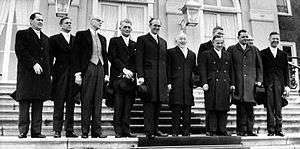De Jong cabinet
| De Jong cabinet | |
|---|---|
|
52nd cabinet of the Netherlands | |
|
The installation of the De Jong cabinet on 5 April 1967 | |
| Date formed | 5 April 1967 |
| Date dissolved | 6 June 1971 |
| People and organisations | |
| Head of state | Queen Juliana |
| Head of government | Piet de Jong |
| Deputy head of government |
Johan Witteveen Joop Bakker |
| No. of ministers | 14 |
| Ministers removed (Death/resignation/dismissal) | 1 |
| Total no. of ministers | 15 |
| Member party |
Catholic People's Party (KVP) People's Party for Freedom and Democracy (VVD) Anti-Revolutionary Party (ARP) Christian Historical Union (CHU) |
| Status in legislature | Majority government |
| Opposition party | Labour Party |
| Opposition leader | Joop den Uyl |
| History | |
| Election(s) | Dutch general election, 1967 |
| Outgoing election | Dutch general election, 1971 |
| Legislature term(s) | 1967–71 |
| Incoming formation | 1967 Dutch cabinet formation |
| Outgoing formation | 1971 Dutch cabinet formation |
| Predecessor | Zijlstra cabinet |
| Successor | First Biesheuvel cabinet |
![Azure, billetty Or a lion with a coronet Or armed and langued Gules holding in his dexter paw a sword Argent hilted Or and in the sinister paw seven arrows Argent pointed and bound together Or. [The seven arrows stand for the seven provinces of the Union of Utrecht.] The shield is crowned with the (Dutch) royal crown and supported by two lions Or armed and langued gules. They stand on a scroll Azure with the text (Or) "Je Maintiendrai" (French for "I will maintain".)](../I/m/State_coat_of_arms_of_the_Netherlands.svg.png) |
| This article is part of a series on the politics and government of the Netherlands |
|
|
Local government |
|
The De Jong cabinet was the executive branch of the Dutch government from 5 April 1967 until 6 June 1971. The cabinet was formed by the political parties Catholic People's Party (KVP), People's Party for Freedom and Democracy (VVD), Anti-Revolutionary Party (ARP) and the Christian Historical Union (CHU) after the Dutch general election of 1967. The cabinet was a majority cabinet in the House of Representatives.
It was the first Cabinet of the Netherlands after World War II that completed a full term without any internal conflicts. The cabinet was confronted with a demand for democratic reforms in the society and it decided to democratise colleges and universities after the famous maagdenhuisbezetting. Plans were made to modernise politics by establishing an electoral system with districts or a chosen prime minister, but these plans were not implemented. Meanwhile, a pay pause due to the decision of employers and employees to raise wages was partly revoked after anti-government demonstrations and strikes. The minister of economic affairs, De Block, resigned, officially as a protest against the wage rise in the metal industry, but another reason was his slow reaction to the inflation and rising prices after the introduction of Value added tax. More unrest took shape in demonstrations against the war in Vietnam. Internationally, relations with Indonesia improved, resulting in a visit by president Suharto, which was, however, overshadowed by the occupation of the Indonesian embassy by Moluccans. The Soviet Union invasion in Czechoslovakia was seen as a reason to increase the defence budget.
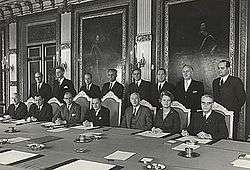
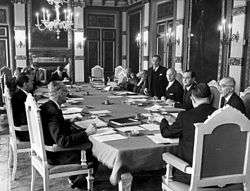

.jpg)
Cabinet Members
| Ministers | Title/Portfolio | Term of office | Party | |||
|---|---|---|---|---|---|---|
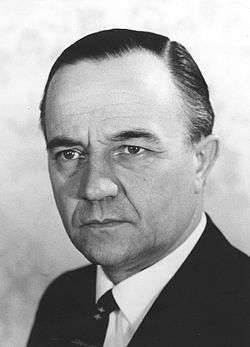 |
Piet de Jong (1915–2016) |
Prime Minister | General Affairs | 5 April 1967 – 6 July 1971 |
Catholic People's Party | |
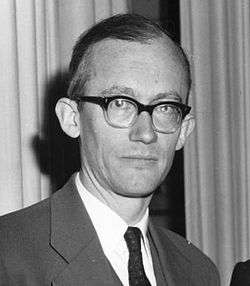 |
Johan Witteveen (born 1921) |
Deputy Prime Minister / Minister |
Finance | 5 April 1967 – 6 July 1971 |
People's Party for Freedom and Democracy | |
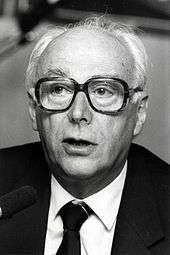 |
Joop Bakker (1921–2003) |
Deputy Prime Minister / Minister |
Transport, Public Works and Water Management / Suriname and Netherlands Antilles Affairs |
5 April 1967 – 6 July 1971 |
Anti-Revolutionary Party | |
 |
Henk Beernink (1910–1979) |
Minister | Interior | 5 April 1967 – 6 July 1971 |
Christian Historical Union | |
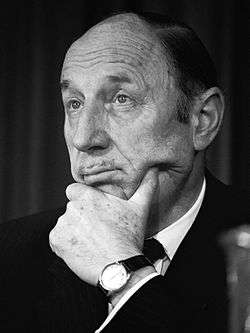 |
Joseph Luns (1911–2002) |
Minister | Foreign Affairs | 2 September 1952 – 6 July 1971 |
Catholic People's Party | |
 |
Carel Polak (1909–1981) |
Minister | Justice | 5 April 1967 – 6 July 1971 |
People's Party for Freedom and Democracy | |
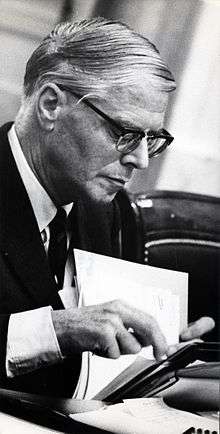 |
Leo de Block (1904–1988) |
Minister | Economic Affairs | 5 April 1967 – 7 January 1970 [Res] |
Catholic People's Party | |
 |
Piet de Jong (1915–2016) |
7 January 1970 – 14 January 1970 [Ad interim] | ||||
 |
Roelof Nelissen (born 1931) |
7 January 1970 – 14 January 1970 | ||||
 |
Willem den Toom (1911–1998) |
Minister | Defence | 5 April 1967 – 6 July 1971 |
People's Party for Freedom and Democracy | |
 |
Bauke Roolvink (1912–1979) |
Minister | Social Affairs and Health | 5 April 1967 – 6 July 1971 |
Anti-Revolutionary Party | |
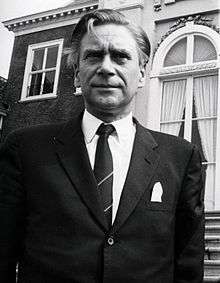 |
Gerard Veringa (1924–1999) |
Minister | Education and Science | 5 April 1967 – 6 July 1971 |
Catholic People's Party | |
.jpg) |
Pierre Lardinois (1924–1987) |
Minister | Agriculture and Fisheries | 5 April 1967 – 6 July 1971 |
Catholic People's Party | |
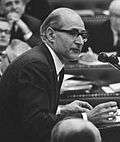 |
Wim Schut (1920–2006) |
Minister | Housing and Spatial Planning | 5 April 1967 – 6 July 1971 |
Anti-Revolutionary Party | |
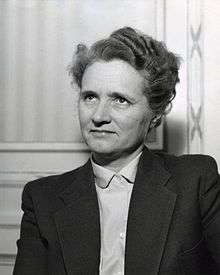 |
Marga Klompé (1912–1986) |
Minister | Culture, Recreation and Social work | 22 November 1966 – 6 July 1971 |
Catholic People's Party | |
| Minister without portfolio | Title/Portfolio/Ministry | Term of office | Party | |||
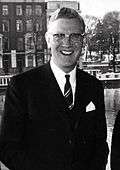 |
Berend Jan Udink (1926–2016) |
Minister | Development Cooperation (within Foreign Affairs) |
5 April 1967 – 6 July 1971 |
Christian Historical Union | |
| Undersecretaries | Title/Portfolio/Ministry | Term of office | Party | |||
 |
Chris van Veen (1922–2009) |
Undersecretary | Civil Service, Urban Policy (within Interior) |
5 April 1967 – 6 July 1971 |
Christian Historical Union | |
 |
Hans de Koster (1914–1992) |
Undersecretary | European Affairs (within Foreign Affairs) |
5 April 1967 – 6 July 1971 |
People's Party for Freedom and Democracy | |
 |
Ferd Grapperhaus (1927–2010) |
Undersecretary | Fiscal Affairs (within Finance) |
5 April 1967 – 6 July 1971 |
Catholic People's Party | |
.jpg) |
Klaas Wiersma (1917–1993) |
Undersecretary | Immigration, Integration and Asylum Affairs, Family Law (within Justice) |
5 April 1967 – 6 July 1971 |
People's Party for Freedom and Democracy | |
 |
Louis van Son (1922–1986) |
Undersecretary | Foreign Trade, Regional Development, Retail, Tourism (within Economic Affairs) |
22 November 1966 – 6 July 1971 |
Catholic People's Party | |
 |
Joop Haex (1911–2002) |
Undersecretary | Royal Netherlands Army (within Defence) |
5 April 1967 – 6 July 1971 |
Christian Historical Union | |
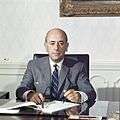 |
Adri van Es (1913–1994) |
Undersecretary | Royal Netherlands Navy (within Defence) |
24 July 1963 – 6 July 1971 |
Anti-Revolutionary Party | |
 |
Bob Duynstee (1920–2014) |
Undersecretary | Royal Netherlands Air Force (within Defence) |
5 April 1967 – 6 July 1971 |
Catholic People's Party | |
 |
Roelof Kruisinga (1922–2012) |
Undersecretary | Healthcare (within Social Affairs and Health) |
5 April 1967 – 6 July 1971 |
Christian Historical Union | |
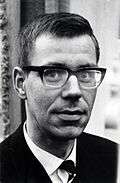 |
Hans Grosheide (born 1930) |
Undersecretary | Elementary Education, Secondary Education, Physical Education (within Education and Science) |
24 July 1963 – 6 July 1971 |
Anti-Revolutionary Party | |
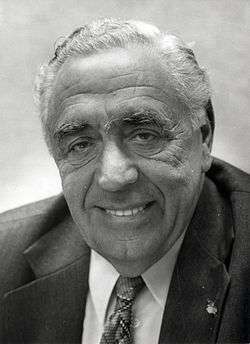 |
Mike Keyzer (1911–1983) |
Undersecretary | Aviation, Cargo Transport (within Transport, Public Works and Water Management) |
5 April 1967 – 6 July 1971 |
People's Party for Freedom and Democracy | |
.jpg) |
Hein van de Poel (1915–1993) |
Undersecretary | Youth Policy, Outdoor Recreation, Nature (within Culture, Recreation and Social work) |
5 April 1967 – 6 July 1971 |
Catholic People's Party | |
| Source: (in Dutch) Rijksoverheid.nl | ||||||
- Res Resigned.
- Ad interim Piet de Jong served ad interim following the resignation of Leo de Block.
Living cabinet members
- As of 2017, the following cabinet members are still alive:
- Johan Witteveen – 12 June 1921
- Roelof Nelissen – 4 April 1931
- Undersecretary
- Hans Grosheide – 6 August 1930
References
External links
- Official
- (in Dutch) Kabinet-De Jong (1967-1971) Parlement & Politiek
- (in Dutch) Kabinet-De Jong Rijksoverheid
| Wikimedia Commons has media related to Cabinet De Jong. |
